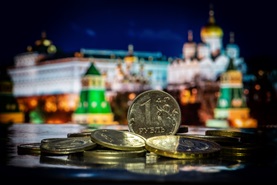Russia-Ukraine Crisis Could Spell Unforeseen ESG Risks for Insurers
The Russia-Ukraine conflict and the subsequent sanctions on Russian entities have led to material and wide-ranging impacts on diversified sectors and international firms. However, company disclosures and other sources suggest that the conflict’s primary impact on the global insurance industry is limited for two main reasons
How a Business Service Management Platform for Cloud and IT Evolved Its ESG at Strategic Scale
BMC Software gained the holistic view of its environmental, social, and governance efforts the company needed to measure its impact, understand how it could scale ESG programs, and communicate successes to stakeholders.
ESG Implications of Russia’s Invasion of Ukraine on the Aviation and Defense Sectors
The aviation industry is feeling the impact of rising fuel costs as an immediate repercussion of the conflict in Ukraine. In particular, the airline sector is still facing significant challenges in mounting a steady recovery from the COVID-19 crisis. On the other hand, the defense industry may be presented with opportunities in light of increased government spending in the aftermath of the invasion.
Governance in Brief – May 25, 2022
Woodside shareholders approve BHP deal Woodside Petroleum’s 2022 AGM has approved the company’s merger with BHP Group’s petroleum business. The merged entity will change its name to Woodside Energy Group Ltd. and will be one of the world’s largest fossil fuel energy producers.
Banks’ ESG Risks Related to the Russia-Ukraine Conflict on Investors’ Radars
Investor interest in the banking sector remains high as the impact of Russian sanctions unfolds. Based on Morningstar Sustainalytics’ research, total unmanaged risk has increased for both Russian and international banks with exposure to Russian clients. To what extent have sanctions affected banks’ total unmanaged risk?
What's Happening in Sustainable Finance: Rhino Bonds Support Conservation, Spotlight on Social Bonds, and More
A round-up of recent developments in the global sustainable finance market. From innovative instruments for financing conservation efforts to growing ESG activity in the private equity space to a new taxonomy for social bonds.
Governance in Brief – May 19, 2022
Moderna’s new CFO leaves after just one day in office Moderna has announced the departure of its newly appointed CFO Jorge Gomez, one day after his official instatement. His departure comes after his former employer, Dentsply Sirona, announced an internal probe into its recent quarterly financial reporting, and in particular the way it accounted for sales incentives.
Governance in Brief – May 12, 2022
TotalEnergies faces shareholder pressure to boost climate targets A group of TotalEnergies shareholders has requested that the firm tighten its greenhouse gas reduction targets to better align its climate strategy with the Paris Agreement. The proponents contend that the proposal would make Total the first oil and gas firm to align its 2030 targets with the agreement’s 1.5°C goal.
Leveraging Blockchain to Improve Supply Chain Management - A Case Study for Household and Personal Products Companies
With growing scrutiny from stakeholders—international regulators and regional governments, NGOs, the general public, investors, and financial institutions—companies accused of human rights violations and environmental damage in their supply chains face substantial risks.
ESG Impacts of the War in Ukraine: Global Food Supply
The invasion of Ukraine highlights the fragility of the global food system. The destruction caused by the war and subsequent trade restrictions on Russia, endangers a significant percentage of the global food supply coming from two of world’s leading agricultural commodity exporters, consequently prompting food prices to surpass the 30-year high.
ESG Benchmarking: Helping Asia Pacific companies excel their sustainability performance
Hear from a panel of ESG thought leaders, sharing their insights on how Sustainalytics ESG Benchmarking Solutions supported them understanding its ESG position among industry peers, identifying gaps and communicating sustainability accomplishments to key stakeholders.
Biodiversity loss and climate change call for a nature-positive economy – Stewardship may lead the way
Financial institutions funding the supply chains affected by biodiversity loss stand to lose right alongside farmers, producers and retailers—and so, in turn, do investors. ESG stewardship continues to be a powerful investor instrument to mitigate risks on a changing planet. With growing expectations of double materiality, it is an opportunity for investors to have a greater societal impact and support the transition towards a nature-positive economy.
High-Impact ESG Issues: What Your Company Needs to Know
All companies are affected by material ESG issues. Poor management of these issues can negatively impact a company’s operations, employee retention, community relations, and ultimately its share price. Learn which ESG issues cut across industries and how companies can address the most impactful MEIs affecting them.
Governance in Brief – April 28, 2022
Meta investors to vote on metaverse risk assessment Meta’s May 25 AGM will consider a shareholder proposal concerning the company’s metaverse vision and the user risks stemming therefrom. The proposal calls for a third-party assessment of the platform’s potential psychological impact, the civil and human rights risks that it poses for its users, and the extent to which these risks are mitigatable or avoidable.
Financing the Future: An Interview on High ESG Risk Industries and Opportunities for Banks
Companies in industrial conglomerates, steel, diversified metals, precious metals, and oil and gas producers can make take meaningful steps to reduce their material environmental, social, and governance (ESG) risk – and the negative impacts that go along with those risks. But they need guidance and access to finance. Read on to learn how banks are working with clients in these high-risk industries to set and meet targets for material improvements on ESG risk factors.








.tmb-small.png?Culture=en&sfvrsn=5376f589_3)



-(1200-x-600-px)-(5).tmb-thumbnl_rc.png?Culture=en&sfvrsn=e57ab91e_4)


